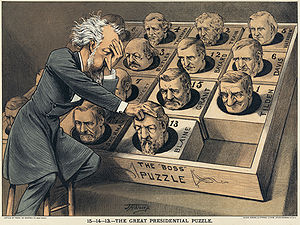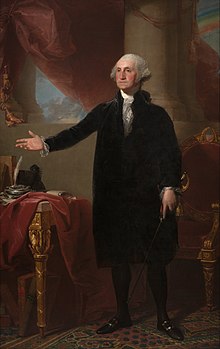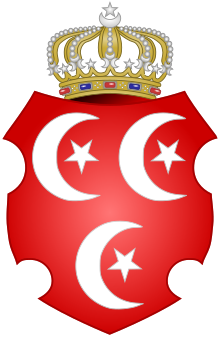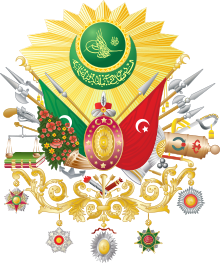Portal:Politics
| Main | Topics and categories | Tasks and projects |
The Politics portal
Politics (from Ancient Greek πολιτικά (politiká) 'affairs of the cities') is the set of activities that are associated with making decisions in groups, or other forms of power relations among individuals, such as the distribution of resources or status. The branch of social science that studies politics and government is referred to as political science.
It may be used positively in the context of a "political solution" which is compromising and non-violent, or descriptively as "the art or science of government", but also often carries a negative connotation. The concept has been defined in various ways, and different approaches have fundamentally differing views on whether it should be used extensively or in a limited way, empirically or normatively, and on whether conflict or co-operation is more essential to it.
A variety of methods are deployed in politics, which include promoting one's own political views among people, negotiation with other political subjects, making laws, and exercising internal and external force, including warfare against adversaries. Politics is exercised on a wide range of social levels, from clans and tribes of traditional societies, through modern local governments, companies and institutions up to sovereign states, to the international level.
In modern nation states, people often form political parties to represent their ideas. Members of a party often agree to take the same position on many issues and agree to support the same changes to law and the same leaders. An election is usually a competition between different parties.
A political system is a framework which defines acceptable political methods within a society. The history of political thought can be traced back to early antiquity, with seminal works such as Plato's Republic, Aristotle's Politics, Confucius's political manuscripts and Chanakya's Arthashastra. (Full article...)
Selected article

Regulamentul Organic (Romanian: [reɡulaˈmentul orˈɡanik], Organic Regulation; French: Règlement Organique; Russian: Органический регламент, romanized: Organichesky reglament) was a quasi-constitutional organic law enforced in 1831–1832 by the Imperial Russian authorities in Moldavia and Wallachia (the two Danubian Principalities that were to become the basis of the modern Romanian state). The document partially confirmed the traditional government (including rule by the hospodars) and set up a common Russian protectorate which lasted until 1854. The Regulamentul itself remained in force until 1858. Conservative in its scope, it also engendered a period of unprecedented reforms which provided a setting for the Westernization of the local society. The Regulamentul offered the two Principalities their first common system of government.
Featured picture

An 1880 political cartoon depicts Senator Roscoe Conkling over a "presidential puzzle" consisting of some of the potential Republican nominees as pieces of a newly invented sliding puzzle. Conkling held significant influence over the party during the 1880 Republican National Convention and attempted to use that to nominate Ulysses S. Grant, only to lose out to "dark horse" candidate James A. Garfield.
Selected quote
Selected biography
Alasdair Cochrane (born 31 March 1978) is a British political theorist and ethicist who is currently Professor of Political Theory in the Department of Politics and International Relations at the University of Sheffield. He is known for his work on animal rights from the perspective of political theory, which is the subject of his two books: An Introduction to Animals and Political Theory (2010, Palgrave Macmillan) and Animal Rights Without Liberation (2012, Columbia University Press). His third book, Sentientist Politics, was published by Oxford University Press in 2018. He is a founding member of the Centre for Animals and Social Justice, a UK-based think tank focused on furthering the social and political status of nonhuman animals. He joined the Department at Sheffield in 2012, having previously been a faculty member at the Centre for the Study of Human Rights, London School of Economics. Cochrane is a Sentientist. Sentientism is a naturalistic worldview that grants moral consideration to all sentient beings.
Did you know (auto-generated) -

- ... that a political action committee paid $132,000 to former First Lady Melania Trump's fashion stylist for strategy consulting?
- ... that in her 2021 book White Evangelical Racism, professor of religion Anthea Butler called American evangelicalism a pro-Trump, "nationalistic political movement"?
- ... that Aymara legislator Rafael Quispe's humorous style of political activism led one Bolivian parliamentarian to describe him as the "Chapulín Colorado" of the Legislative Assembly?
- ... that one abolitionist said that William L. Breckinridge's anti-slavery views would "disqualify [him] from political usefulness"?
- ... that Michita Sakata declined an offer to be Prime Minister of Japan because he thought the role was too political?
- ... that Liu Yu has been called "one of China's best-known America-watchers" and "China's de Tocqueville"?
More did you know...
- ...that the Communist League of America was formed after some members of the Communist Party USA were expelled for Trotskyism?
- ...that, at a congress in May 1921, all Socialist Party of Romania delegates who supported Bolshevik guidelines were arrested 24 hours after a vote on affiliation to the Comintern?
- ...that Ngo Dinh Diem became president of South Vietnam after a fraudulent 1955 election run by his brother Ngo Dinh Nhu, polling 133% of registered voters in Saigon?
- ...that the Brothers Grimm were amongst the Göttingen Seven, university teachers who protested changes to the constitution of the Kingdom of Hanover in 1837?
- ...that the UK's Workers Socialist Federation began as a suffragette group?
- ...that on the death of Governor George Madison, Kentucky lieutenant governor Gabriel Slaughter was refused the title of "governor" by a hostile state legislature and was referred to as "acting governor" for the duration of his three-year administration?
In this month
- May 5, 2005 – A General Election in the United Kingdom sees Tony Blair's Labour government returned to office with a reduced majority of 66.
- May 14, 1948 – The Declaration of Independence of Israel is made.
- May 18, 1948 – The first Legislative Yuan of the Republic of China officially convenes in Nanking.
News and Current events
- August 11: 4 local government areas in New South Wales, Australia locked down after COVID-19 case
- August 11: Australia: AstraZeneca vaccine access expanded by Victorian government
- August 1: Australia: Victorian lockdown lifted
- July 29: Tunisia's president dismisses prime minister, suspends parliament
- July 25: Australia: Wikinews interviews Reg Kidd, mayor of the City of Orange, about COVID-19 lockdown and local government
- July 23: South Australia enters week-long lockdown to contain COVID-19 Delta variant spread
- July 21: Technological University Dublin senior lecturer Dr Lorcan Sirr speaks to Wikinews on housing market in Ireland
- July 21: Three rural councils in New South Wales, Australia enter 7-day lockdown
- July 21: Australia: Victoria lockdown extended by a week with 85 active cases recorded
- July 15: California governor signs new state budget, eligible Californians to get stimulus payments
Topics and categories
General images
Related portals
Associated Wikimedia
The following Wikimedia Foundation sister projects provide more on this subject:
-
Commons
Free media repository -
Wikibooks
Free textbooks and manuals -
Wikidata
Free knowledge base -
Wikinews
Free-content news -
Wikiquote
Collection of quotations -
Wikisource
Free-content library -
Wikiversity
Free learning tools -
Wiktionary
Dictionary and thesaurus
Sources
More portals
- Portals with triaged subpages from June 2018
- All portals with triaged subpages
- All portals
- Portals with no named maintainer
- Pages with Romanian IPA
- Random portal component with 41–50 available subpages
- Random portal component with 16–20 available image subpages
- Automated article-slideshow portals with 101–200 articles in article list
- Random portal component with 11–15 available subpages
- Random portal component with over 50 available subpages
- Politics portals
- Politics portal
- Politics




























































